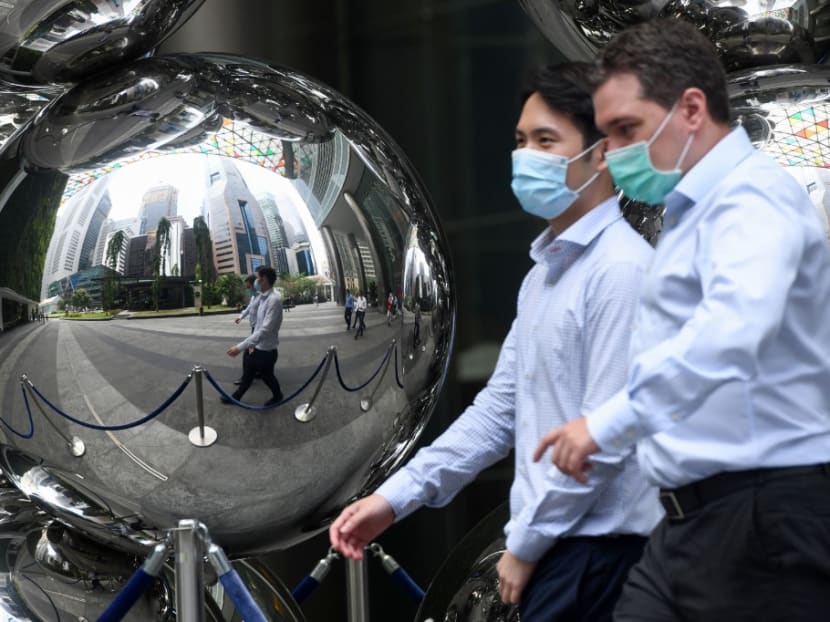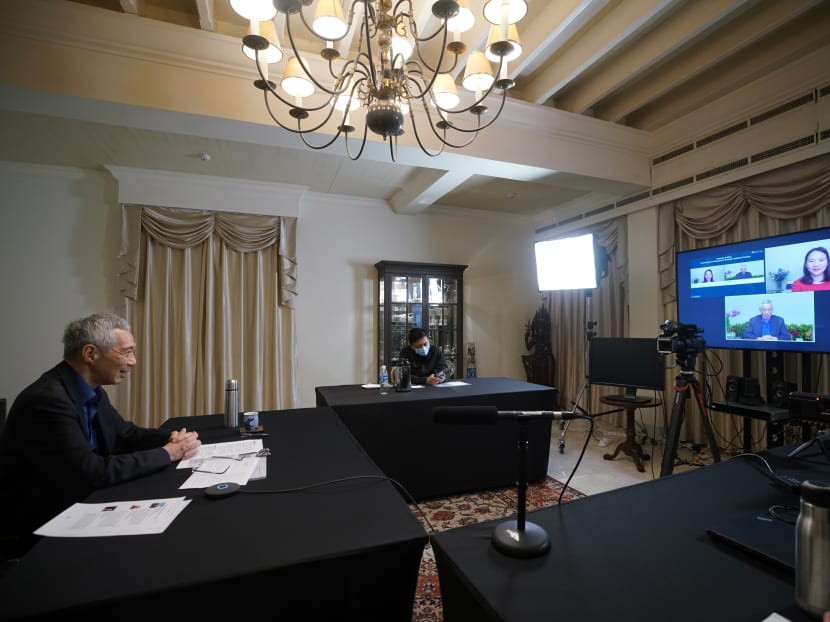With diverse tech talent needed, Singaporeans and foreigners need to ‘make the effort’ to address social friction: PM Lee
SINGAPORE — It is not a unique problem that Singaporeans feel pressured by large numbers of foreign talent in the technology field, even though the industry depends on a diversity of such skilled workers from all over the world, Prime Minister Lee Hsien Loong said.

Men pictured walking past an art installation in the financial business district in Singapore. Prime Minister Lee Hsien Loong said that the Government must be able to show that staying open to foreigners is beneficial to Singaporeans.
- PM Lee tackled questions at a forum on Singapore’s ability to draw tech talent, among others
- He admitted that Singapore’s early response to Covid-19 was not the best due to legacy IT issues and outmoded attitudes
- Singapore lacks not just young tech talents, but especially those in the mid-to-senior levels
- With large numbers of foreign professionals needed, they and Singaporeans will have to work at getting along
SINGAPORE — It is not a unique problem that Singaporeans feel pressured by large numbers of foreign talent in the technology field, even though the industry depends on a diversity of such skilled workers from all over the world, Prime Minister Lee Hsien Loong said.
He was speaking on Tuesday night (Nov 17) at the opening webinar of the Singapore Tech Forum that is held over four days.
“When you have large numbers of foreign professionals in the industry, there will be social issues that will arise and Singaporeans in the same field, in particular, will feel a sense of competition and even discomfort,” he said.
Singapore acknowledges these issues “candidly” and addressing the problem requires both sides to work at it, he added.
“The non-Singaporeans have to make the effort to fit in both at work and socially.
“Singaporeans, on their part, have to be able to understand that this is how new jobs will be created (here) and have to feel assured that they will be fairly treated and will not be discriminated against.”
The forum is organised by the Singapore Global Network and the Government Technology Agency, and Tuesday’s webinar was moderated by Ms Karen Tay, the director of the Smart Nation and Digital Government Office. At the session, Mr Lee queried an overseas grouping of Singaporeans and non-Singaporeans about the tech industry here and the Government’s strategy on growing the sector.

Several questions that participants asked were about Singapore's ability to attract foreign tech talent, after Mr Lee said in his opening remarks that there was a lack of people at the mid-to-senior levels who are experienced in building, developing and managing large technological projects and systems.
Mr Lee said that Singapore already issues employment passes to qualified foreign professionals “more liberally” compared with passes for the lower levels of the workforce, as well as with other countries’ foreign work passes such as the United States’ H1B visa.
Most recently, the Government launched the Tech.Pass scheme, a flexible work pass that allows highly accomplished tech talent to work in Singapore and not be restricted to a single role or employer.
When asked by Ms Tay about how Singapore is not immune to protectionism and concerns about job opportunities for its resident workers, Mr Lee said that the Government must be able to show that staying open to foreigners is beneficial to Singaporeans, as has been the case for many years.
“We have to watch the mix, because if you have a lot of concentration (of foreigners from one source), you have a problem,” he said.
While Singapore’s multi-ethnic population may suggest on the surface that any foreigner who are Chinese, Indian or Malay can fit in, the reality is that Singaporean Chinese, Indians and Malays have shared values and expectations and have made accommodations on how to get along.
“When you come in from abroad, you may be the same ethnic group, but it's not quite the same culture. And there can be a clashing of gears and we have to be able to manage that,” Mr Lee said.
PM LEE ON OTHER ISSUES
Beyond the foreign talent issue, participants at the forum peppered Mr Lee with other questions that ranged from Singapore’s smart nation ambitions and the technological hurdles to digital adoption to the impact of technological divisions in the midst of growing tensions between the United States and China.
The following are four excerpts from the webinar.
1. Singapore's attractiveness to talent
The moderator, Ms Tay, pointed out that with the ongoing US-China conflict, tech workers have been thinking hard about where to settle down in the world and largely base their decisions on factors such as the breadth of opportunities available, and the culture of work and society.
On the final point, she asked Mr Lee about Singapore’s hierarchical work culture and the socio-political concerns surrounding its lesbian, gay, bisexual, transgender, transsexual and queer (LGBTQ) acceptance.
Mr Lee said in response that the work culture largely depends on the companies, while Singapore’s arts and culture scene is no longer the “cultural desert” it was once called.
He added that while Singapore’s social norms are not the same as San Francisco, where Silicon Valley is, other parts of America do not share the same values as the “extremely liberal” city, he noted.
Even then, attitudes are not fixed in stone, Mr Lee added.
“We have LGBTQ people in Singapore and they live their lives as valued members of society. We welcome them. And we greatly appreciate their contributions and there's no reason why, if you are a member of this community, you should not fit in in Singapore.”
2. Growing Singapore tech companies
Addressing the point on whether opportunities for tech talent are ample in Singapore, Mr Lee said that this was a chicken-and-egg problem: The number of opportunities depend on the number of these talents coming here.
Apart from that, tech companies in Singapore are now looking for manpower to handle more engineering work such as data centres, even though the opportunities they offer may not be on the scale of the “Faang” companies, referring to Facebook, Amazon, Apple, Netflix and Alphabet, which owns Google.
“But one day, as Southeast Asia grows and as infrastructure in the region develops, I think there will be a need (for more engineering work) as some of the demand can be done from (this) part of the world,” he said.
Responding to another question about whether Singapore’s strategy of bringing in multinational companies (MNCs) will hurt the growth of domestic firms, Mr Lee said that Singapore cannot set out to “breed” tech unicorns.
“We create the conditions, we train the people, we enable companies to start up and to prosper and to compete. And we hope that (homegrown) talent will develop… or (be from) somebody else coming to Singapore. And one day, we'll either grow a unicorn or strike a homerun.”
Instead of hoping for unicorns though, Mr Lee said that his objective is to have a vibrant industry for Singapore companies and MNCs.
“That creates not just jobs for Singaporeans, but also a certain buzz, which puts us on the map and connects us to other centres where there's buzz and excitement in the world.”
3. ‘Blind spots' in digital infrastructure
In his opening remarks, Mr Lee said that technology is a “command function” beyond the Covid-19 pandemic alone.
“Senior leaders have to understand that technology is central to their role governing Singapore and doing public administration. All public service(s) need leaders to understand technology. More (of them) need to appreciate technology, more of them must understand the technology,” he said.
Singapore must have enough of such leaders who can provide technical leadership on complex engineering projects “while thinking and taking into account the social and policy aspects of the requirements”, he added.
Singapore is still a work-in-progress on its digital smart nation ambitions.
Recalling the Government’s earlier response to the unfolding Covid-19 pandemic, Mr Lee described how it discovered blind spots in its digital systems, which had been built over the years, were not fully up-to-date and did not work seamlessly together.
For example, some IT systems could only be updated manually through Excel spreadsheets and in batches, rather than continuously using modern techniques.
“And when (Covid-19) cases are multiplying, all these delays and inefficiencies make a difference,” he said.
Mr Lee later elaborated on how, beyond the pandemic, it is a challenge for any government to move away from legacy systems and the settled ways of doing things.
It takes determination, engineering capabilities and talent to make it work, he said.
“In the case of Singapore’s civil service and public sector, the senior management is fully sold that this is an essential thing to do — that we must make full use of tech and we have to reinvent,” he said.
4. Impact of US-China tech war
Several participants then quizzed Mr Lee about the technological impact of the US-China conflict on Singapore.
They noted how in recent months, Singapore has attracted a significant amount of investments from top tech firms from both countries — with Alibaba, Tencent and ByteDance from China, and the Faangs from the US.
Responding to Ms Tay on whether there was a certain risk to Singapore, Mr Lee said that this would depend on how the relationship between the two superpowers develop under US president-elect Joe Biden.
“We will have to see how he manages that relationship. The contradictions between the US and China are deep-seated ones and are not caused by the (Donald) Trump administration… Steps have been taken, which have ratcheted up the contradictions and which will be not so easy to dial down again.”
However, Mr Lee said that it is still possible to de-escalate and manage tensions since both the US and China will need to get along together, do business with each other, and overcome the pandemic.
“And then, I think there’s a path forward for Singapore and other countries.”
Mr Lee warned though, that the tensions could also escalate to a serious confrontation between the two powers of nearly equal size.
At the micro level, Ms Tay noted how it could end up in a case where tech talent may be forced to pick a side between the two countries, in which “going through one door will lead the other door to close behind you”.
Mr Lee agreed, adding: “Indeed, it will be a loss for them and it will be a loss for all of us as well, because it means less cross fertilisation, less sharing of ideas and less progress.”











